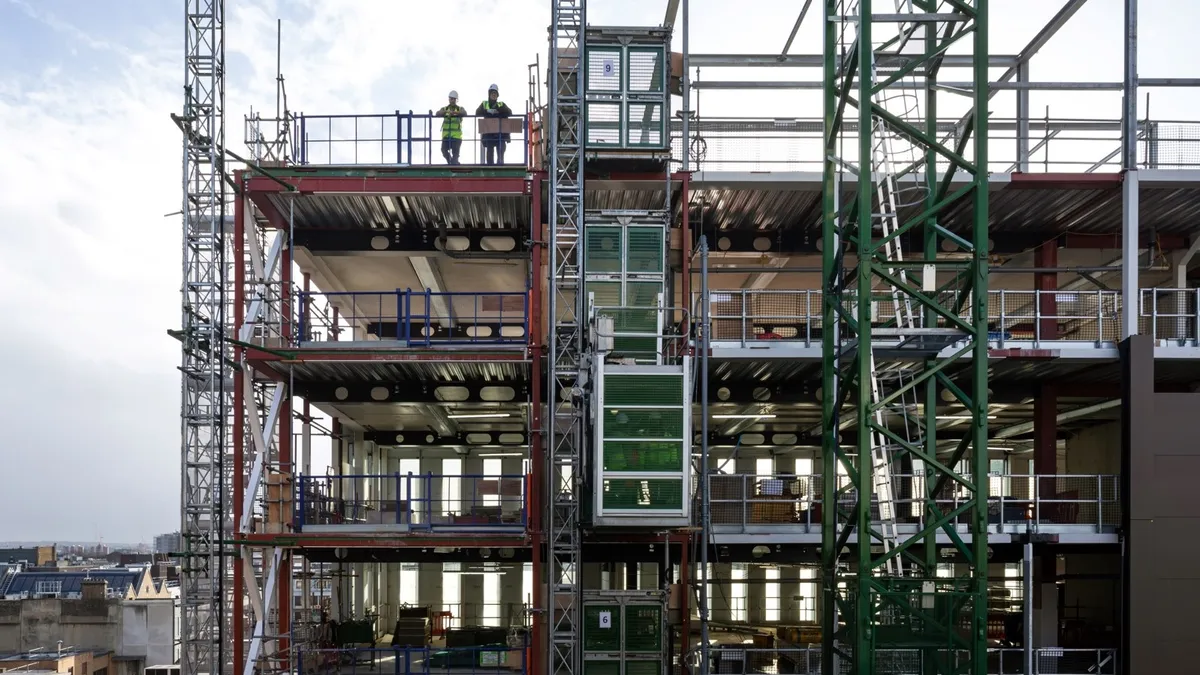Dive Brief:
- Bryden Wood, a U.K.-based design company that takes a "kit-of-parts" approach to prefab construction, will soon open a new U.S. headquarters in Boston, according to a company release.
- Jaimie Johnston, Bryden Wood board director, and Phil Langley, board director and head of the creative technologies division, will lead the company’s U.S. expansion.
- Bryden Wood said it's targeting increased interest in prefab construction methods in the U.S., particularly in the data center, healthcare and multifamily sectors.
Dive Insight:
While modular techniques still have not fully clicked in mainstream construction, prefab construction continues to make inroads in the industry.
“We’re consistently being asked the same questions by our U.S. clients and general contractors — can you develop a kit of parts approach?" said Johnston. “We can feel there’s a real interest in what we’re doing, there’s definitely an appetite. The time was right to expand that existing workload and to meet new clients.”
While modular construction focuses on fully built structures manufactured offsite, prefab targets smaller, prebuilt components, such as pre-assembled wall panels.
But Bryden Wood's brand of prefab eschews pure offsite construction. Instead, it attempts to cut out the challenge of transport by making “the building site into a factory,” said Johnston.
“If you make things offsite, that obviously introduces the cost of the factory, downtime of the factory, the transport, the lifting and shifting,” said Johnston. “If you get the same levels of quality and productivity on site, that’s even better. Then I’ve got all the benefits of manufacturing without the cost of doing it remotely.”
The first major commercial project using Bryden Wood’s approach is The Forge (pictured above). The project, scheduled for completion in the fourth quarter this year, is a two-building office in central London.
In the U.S., Bryden Wood is currently working with the Boldt Co., an Appleton, Wisconsin-based general contractor, on a manufacturing facility. Amazon Web Services, DPR Construction and Equinix, a Redwood City, California-based real estate investment trust, are also customers, said Johnston.
Focusing on data centers
Data center construction has been surging, fueled by huge growth in e-commerce. Though that type of demand will likely cool off this year, a surge in orders by other users should keep activity in the sector high.
“One thing I found fascinating is all [data centers] are slightly different,” said Johnston. “We work in all of them for different clients.”
Despite those differences, the company's kit-of-parts approach tries to leverage the similarities in each project by providing standardization at the component level, while allowing for design freedom at the project level, Johnston said. In other words, the way the kits of parts are put together is customized for each building but because the components are the same, the team can realize the benefits of manufacturing efficiency.
For example, most data center clients buy air handling units and transformers from the same suppliers, said Johnston, so to a certain extent, they are already using common components. Data centers are also sized on increments of standard server racks. But how they're configured and connected varies by client, Johnston said.
“In the U.K., there's massive government interest in [prefab and modular,] there's been a lot of policy and strategy around this topic," said Johnston. "In the U.S., it's completely different. There's no federal interventions, but the big serial clients have arrived at the same conclusion that this repeatability is where they need to be."














